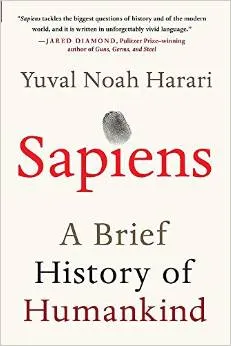What Makes Humans Different? Fiction and Cooperation
Historian Yuval Noah Harari previews his book on the past and future of Homo sapiens
/https://tf-cmsv2-smithsonianmag-media.s3.amazonaws.com/filer/d6/62/d6623991-23c1-43e2-9aa2-76bb4141a9b3/42-63176877.jpg)
Yuval Noah Harari has a few unconventional theories about humankind: religion is our greatest invention, and our species itself will evolve into something new within a couple hundred years. A lecturer in history at the Hebrew University of Jerusalem, Harari is the author of Sapiens: A Brief History of Humankind, out in the U.S. in February. We traded emails about human contradiction, techno-religions, and our need to tell stories to each other and ourselves.
Is there a unique trait linking all human beings?
The truly unique trait of Sapiens is our ability to create and believe fiction. All other animals use their communication system to describe reality. We use our communication system to create new realities. Of course not all fictions are shared by all humans, but at least one has become universal in our world, and this is money. Dollar bills have absolutely no value except in our collective imagination, but everybody believes in the dollar bill.
What’s the most misunderstood fact about the history of our species?
The crucial importance of cognitive dissonance. Humans have an amazing capacity to believe in contradictory things. For example, to believe in an omnipotent and benevolent God, but somehow excuse Him from all the suffering in the world. Or our ability to believe from the standpoint of law that humans are equal and have free will and from biology that humans are just organic machines. Our medical system and our legal system are built on contradictory assumptions. Yet we somehow live with this contradiction.
We’ve evolved into incredibly social beings. What's the best explanation for that?
The Sapiens secret of success is large-scale flexible cooperation. This has made us masters of the world. But at the same time it has made us dependent for our very survival on vast networks of cooperation. This process has accelerated over the millennia, so that today nearly all of the things we need for survival are provided by complete strangers. I don’t know how to produce the food I eat, how to sew the clothes I wear, or how to build the house in which I live. I write history books, get paid for it, and buy 99 percent of what I need from strangers. It is no wonder that the size of the Sapiens brain has been decreasing over the last 10,000 years.
What has been humanity’s greatest invention?
Humanity's greatest invention is religion, which does not mean necessarily mean belief in gods. Rather, religion is any system of norms and values that is founded on a belief in superhuman laws. Some religions, such as Islam, Christianity and Hinduism, believe that these superhuman laws were created by the gods. Other religions, such as Buddhism, Communism and Nazism believed that these superhuman laws are natural laws. Thus Buddhists believe in the natural laws of karma, Nazis argued that their ideology reflected the laws of natural selection, and Communists believe that they follow the natural laws of economics.
No matter whether they believe in divine laws or in natural laws, all religions have exactly the same function: to give stability to human institutions. Without some kind of religion, it is simply impossible to maintain social order. During the modern era religions that believe in divine laws went into eclipse. But religions that believe in natural laws became ever more powerful. In the future, they are likely to become more powerful yet. Silicon Valley, for example, is today a hot-house of new techno-religions, which promise us paradise on earth with the help of new technologies. From a religious perspective, Silicon Valley is the most interesting place in the world.
Is there a role for the individual in the grand history of humankind?
Certainly. History is a very unexpected process. Time and again the most unlikely events take place. For example, in the third and fourth centuries AD an esoteric Jewish sect took over the mighty Roman Empire. In the seventh century a religion born in a remote corner of the Arabian Desert managed to establish the largest empire in the world. In 1917 the Communist Party, boasting a mere 23,000 members, gained control of the mighty Russian Empire, which had 180 million subjects. There were no deterministic reasons mandating the Christian, Muslim or Communist victories. There was nothing about the climate or geography of the fourth-century Mediterranean basin that made it inevitable that Christianity rather than Manicheanism, Mithraism or Zoroastrianism would come out on top. It had a lot to do with quirky coincidences and quirky individuals.
An even more important role for the individual is to serve as the bottom line of history. In the end, history is about happiness and suffering, which exist only at the level of the individual. A nation never suffers. A corporation never suffers. Only individuals suffer.
What's next for humankind?
Given current technological advances, it seems unavoidable that humans will disappear within a century or two. I don’t think we will be destroyed in some nuclear or ecological catastrophe. Rather, I think that we will upgrade ourselves into something completely different. Humans are going to acquire abilities that were traditionally thought to be divine abilities.
Humans may soon be able to live indefinitely, to design and create living beings at will, to surf artificial realities directly with their minds, and to change their own bodies and minds according to their wishes. The most amazing thing about the future won't be the spaceships but the beings flying them. This will result in enormous new opportunities as well as frightful new dangers. There is no point being optimistic or pessimistic about it. We need to understand that this is really happening—it is science rather than science fiction—and it is high time we start thinking about this very seriously.
